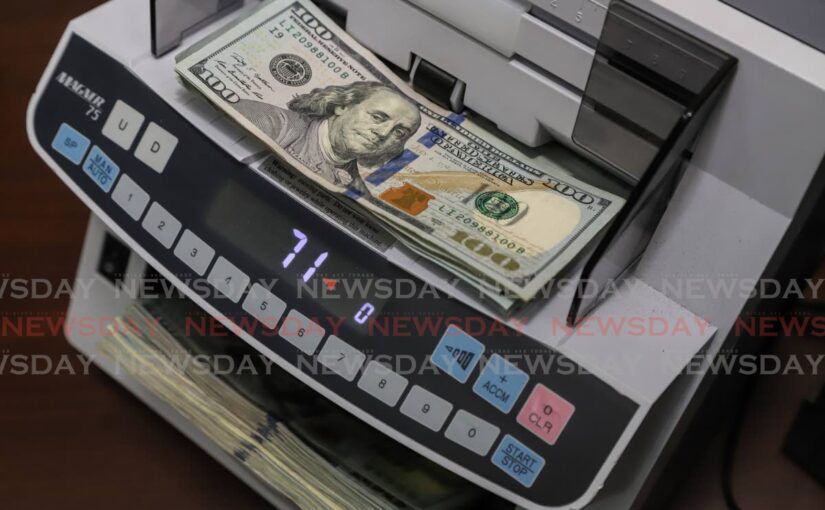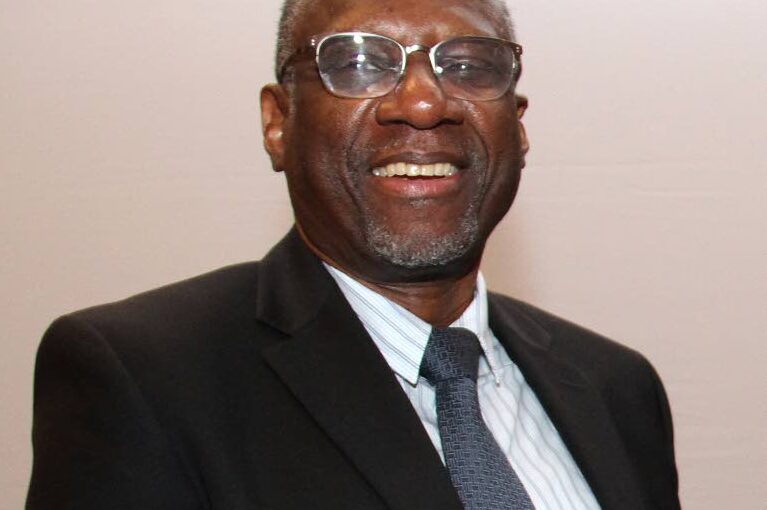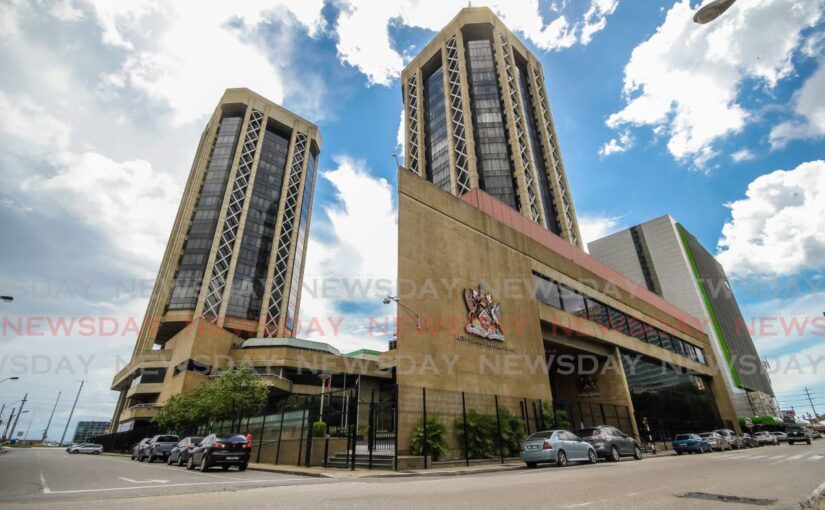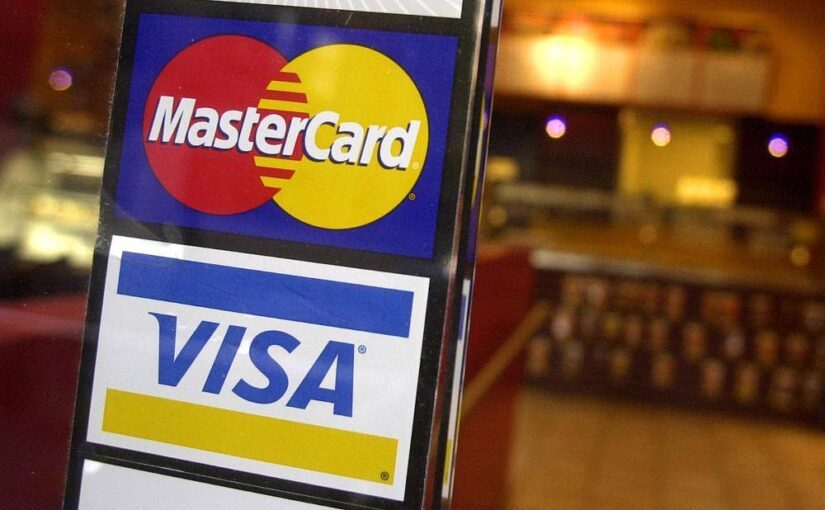FORMER Central Bank deputy governor Dr Terrence Farrell says the removal of exchange controls when the Trinidad and Tobago dollar was floated has...
Vous n'êtes pas connecté
- English
- Français
- عربي
- Español
- Deutsch
- Português
- русский язык
- Català
- Italiano
- Nederlands, Vlaams
- Norsk
- فارسی
- বাংলা
- اردو
- Azərbaycan dili
- Bahasa Indonesia
- Հայերեն
- Ελληνικά
- Bosanski jezik
- українська мова
- Íslenska
- Türkmen, Түркмен
- Türkçe
- Shqip
- Eesti keel
- magyar
- Қазақ тілі
- Kalaallisut ; kalaallit oqaasii
- Lietuvių kalba
- Latviešu valoda
- македонски јазик
- Монгол
- Bahasa Melayu ; بهاس ملايو
- ဗမာစာ
- Slovenščina
- тоҷикӣ ; toğikī ; تاجیکی
- ไทย
- O'zbek ; Ўзбек ; أۇزبېك
- Tiếng Việt
- ភាសាខ្មែរ
- རྫོང་ཁ
- Soomaaliga ; af Soomaali
Rubriques :
 Maroc - NEWSDAY.CO.TT - A la Une - 25/Jul 08:06
Maroc - NEWSDAY.CO.TT - A la Une - 25/Jul 08:06
Working for the Yankee dollar
IN 2021, the World Bank estimated TT’s total imports at US$5.76 billion. More recently, the Central Bank of TT's monetary policy report for May 2024 said imports were recorded at US$1.72 billion for the fourth quarter of 2023, a year-on-year reduction from the same period in 2022 of one per cent. The World Bank said more than 3,000 products were imported into TT for 2022. For each of these products, businesses require foreign exchange (forex) to trade on international markets. Forex is also required in many cases when paying to import products. The fact is, for TT, every aspect of foreign trade requires access to foreign exchange, especially US dollars, the universal currency of this hemisphere. So when business owners complain about not having enough, that claim is by no means trivial. Small and medium enterprises (SMEs) usually depend on banks, but are at a particular disadvantage, having limited access to foreign exchange and limited relationships with banks. But banks have had to manage the flow of foreign exchange to customers, leading to adjustments to credit-card limits, which many SMEs use, in one way or another, to buy products online for import. With new policies in place, small businesses are finding themselves under added pressure to find forex for imports. Falling forex The Central Bank is responsible for the management of the forex market under the Exchange Control Act. It licenses authorised dealers in foreign exchange, which includes commercial banks and non-bank financial institutions such as insurance firms and currency exchanges. The Central Bank acts as one of the suppliers of foreign exchange to commercial banks and other institutions. Banks also get foreign exchange from customer conversions. For businesses, there are a few ways to gain access to forex. The first is through the banking system, and the second is through forex earned for products that are exported. Examples of this are products manufactured in TT and exported, or forex-denominated loans with banks and financial institutions. For small and micro businesses, credit-card transactions are also one of the major ways to gain access to foreign exchange, as this way they can buy products directly online, instead of by wire transfer. “A lot of micro and small businesses use their credit cards to purchase goods, mainly imports, and then resell them locally," said president of the TT Chamber of Industry and Commerce (TTCIC) Kiran Maharaj. [caption id="attachment_1098274" align="alignnone" width="693"] TT Chamber president Kiran Maharaj delivers her remarks at the TT Business Outlook 2024 seminar.Photo courtesy TT Chamber -[/caption] She added since the loss of jobs and changes in employment in the post-pandemic period, the chamber has observed that there has been development in the growth of the informal economy – a diversified set of economic activities, enterprises, jobs and workers that are not regulated or protected by the state. “This means additional demand for foreign exchange by micro and small business,” she said. The Central Bank’s monetary policy report said sales of foreign exchange by authorised dealers to the public amounted to US$2.3 billion from January-May this year. Data on transactions over US$20,000 revealed the retail and distribution sector accounted for 15.4 per cent of those sales and credit-card transactions accounted for 44.5 per cent. As a result, the net sales gap reached US$540.3 million for that period. The report said to support the market, the Central Bank sold US$500 million to authorised dealers. For 2023, authorised sales to the public amounted to US$6.8 billion, as compared to US$6.5 billion the year before. The estimations for that year are similar – credit-card transactions accounted for an estimated 40 per cent of transactions over US$20,000. Retail and distribution followed with 18.4 per cent, then energy companies with 16.8 per cent. But sales from authorised dealers to the public have declined. The monetary policy report indicated that from January-May this year, sales saw an 11.4 per cent drop. Coincidentally, revenue from oil and gas production has also seen a decline. The mid-year review in Parliament on June 7 reported a $3 billion drop in revenue, from $54 billion projected in budget 2024 to $51 billion now. Minister of Finance Colm Imbert said the revenue decline was the result of a dip in natural gas prices, but multiple publications, including the International Monetary Fund’s country report, pointed to additional problems, such as a decline in oil and gas production. The contraction in the energy sector also affected foreign-exchange supply, as the sector supplies three-quarters of forex, according to the IMF. The Central Bank’s monthly report on foreign reserves indicated a reduction of nearly US$1 billion. In May 2023, net official reserves were US$6.75 billion, with an estimated 8.5 months of import cover. In February this year, reserves were US$5.6 billion, with 7.9 months’ import cover. As energy companies brought in less foreign exchange, the Central Bank’s report said there was a higher demand on banks to lend foreign currency to the public, which suppressed foreign currency deposits. The Central Bank said there was an increase of foreign currency credit by 25.4 per cent in April, up from 17.8 per cent in October 2023. Small businesses, big problems Amid these reductions in foreign exchange, banks have also tightened their purses. Last week, RBC announced it will cut its monthly foreign-currency spending limit by US$1,500 (TT$10,000), for personal and business banking clients, effective September 1. A Newsday report said those clients’ monthly limits will be reduced from US$7,500 (TT$51,000) to US$6,000 (TT$41,000). In a notice to RBC customers, the bank admitted the reduction in the limit was because of constraints in foreign currency access. This is not the only bank to reduce its limits in recent times. In 2023, Republic Bank cut its spending limits on credit cards from US$10,000 to US$5,000. In 2020, Scotiabank announced its monthly credit card on foreign-currency transactions may not exceed US$3,000 per billing cycle. [caption id="attachment_1098276" align="alignnone" width="646"] Vivek Charran, president of the Confederation of Regional Business Chambers. -[/caption] The chairman of the Confederation of Regional Businesses and HD Charran and Co Ltd, Vivek Charran, said businesses such as stationery stores, which are currently in the back-to-school season, will have had to buy items for import months in advance, but now that they will have to pay, they may not get access to the necessary foreign exchange for the goods and containers, which may all require US currency. He said payments may be piecemeal, or not at all. He said a 40-foot, high-cube container, which would give a business the best value for imports, costs more than US$50,000. “When we go into the banks we ask to purchase US dollars to make a wire transfer – so that is based on the invoice of goods that we are purchasing. Some people may actually go abroad and make their orders. "But the reality is, reports have come back to me that it has been difficult to buy large sums of US dollars for business purposes.” Maharaj said it is worse for SMEs that do not have banking relationships. She said 65 per cent of transactions performed in TT are cash transactions, which happen outside the banking sector. At a panel discussion at the TTCIC’s economic outlook forum, TT Finance Centre (TTIFC) CEO John Outridge said of the 25,000 small businesses in TT, about 88 per cent did not possess the right information to open a business bank account. He added that 76 per cent of SMEs and MSMEs did not have means to transact electronically. A business bank account is one of the key features needed for a successful business, he said. “We are in 2024. When you are doing business with someone on another island, one of the key things is: how do we pay each other?” Maharaj said since these businesses do not have formal relationships with a bank, many services provided by the bank will not be accessible to them. Want forex? Earn forex Maharaj said in order for businesses to secure access to foreign exchange, they will have to earn more through exports. “We need to develop new revenue streams,” she said. “This is why the chamber has been pushing for investment to support entrepreneurs and start-ups, as well as entities with the potential to scale up. We want to grow local business.” [caption id="attachment_1098278" align="alignnone" width="750"] RBC cuts its credit limits. -[/caption] In January the chamber signed an agreement with the TT Stock Exchange to aid in the development of the small and medium sector, through initial public offerings which will give businesses an opportunity to expand and investors an opportunity to invest. She added that there was also a need to decrease forex usage on things such as food, through developing the agricultural sector. Charran said it may be time to review which businesses get preferential access to foreign exchange. “Who is it in within the commercial banks that determines which customers get the forex to run their businesses?" He noted that a preferential schedule for people importing important goods was in place during the covid emergency period, such as food, toiletries and medicine. He said apparently, that is still in play. “Does it make sense, really? Because we are no longer in a pandemic, there is no shortage of food and there isn’t a situation where more medicine is needed.” Maharaj said businesses are currently using any means necessary to access foreign exchange, whether through multiple credit-card accounts and US loans, while others are revising their business models to use local service providers to provide similar products, instead of what was usually imported. The chamber advised businesses to invest in sectors that will transform the economy to provide import substitution, such as the orange economy, which deals with intellectual property, agriculture, and the export of professional and other services. Maharaj added that businesses should also invest globally to secure a stream of returns in foreign currency. “The matter of forex supplies is a complex issue,” she concluded. “The country needs to either increase its earnings of forex or reduce the forex demand." The post Working for the Yankee dollar appeared first on Trinidad and Tobago Newsday.
Articles similaires
Only Bank of America takes cash from Jamaica
Jamaica only has a single correspondent bank that’s willing to provide it with cash services, and that is partly why consumers are subjected to such...
Why I’m leaving after 10 years
IN a candid discussion on X, formerly called Twitter, Kyle Maloney, co-founder of Tech Beach, captured a sentiment that resonates with many in our...
Contours Of The Financial Mess In The Maldives – Analysis
President Mohamed Muizzu is seeking bailouts from India and China. Maldives in a financial mess and is looking out for bailouts from India and...
Understanding Islamic Finance – Analysis
A bit of history Islamic finance during the time of the Prophet Muhammad was characterized by real transactions such as sale on credit and...
Understanding Islamic Finance – Analysis
A bit of history Islamic finance during the time of the Prophet Muhammad was characterized by real transactions such as sale on credit and...
Dangote refinery and Nigeria’s forex crisis
Adedeji said that the pressure on foreign exchange would drastically reduce if sales of crude oil to Dangote were dominated by local currency. The...
S&P report: Low growth due to declining hydrocarbon sector
ON September 6, S&P Global Ratings affirmed its 'BBB-/A-3' long- and short-term foreign and local currency sovereign credit ratings on Trinidad and...
Can Trinidad and Tobago really go cashless?
I had intended to write on the re-aligned feminisation of poverty this week but the headlines in the press about the results of the CSEC maths and...
Is the Multi-Currency System Legal?
Even before 2009, when the Zimbabwe dollar disappeared in a hyper-inflationary implosion, foreign currencies were used to pay for goods and services...
Les derniers communiqués
-
Aucun élément




